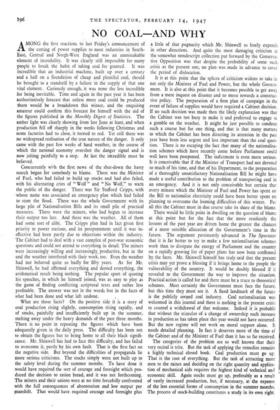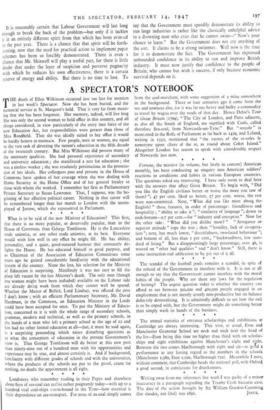NO COAL-AND WHY
AMONG the first reactions to last Friday's announcement of the cutting of power supplies to most industries in South- East, Central' and North-West England was an unmistakable element of incredulity. It was clearly still impossible for many people to break the habit of taking coal for granted. It was incredible that an industrial machine, built up over a century and a half on a foundation of cheap and plentiful coal, should be brought to a standstill by a failure in the supply of that one vital element. Curiously enough, it was none the less incredible for being inevitable. Time and again in the past year it has been authoritatively forecast that unless more coal could be produced there would be a breakdown this winter, and the enquiring amateur could confirm this forecast for himself with the aid of the figures published in the Monthly Digest of Statistics. The amber light was clearly showing from last June at least, and when production Fell off sharply in the weeks following Christmas and some factories had to close, it turned to red. Yet still there was no widespread realisation of the true nature of the danger. It only came with the past few weeks of hard weather, in the course of which the national economy overshot the danger signal and is now jolting painfully to a stop. At last the intralible must be believed.
Concurrently with the first news of the shut-down the hasty search began for somebody to blame. There was the Minister of Fuel, who had failed to build up stocks and had also failed, with his alternating cries of " Wolf " and "No Wolf," to warn the public of the danger. There was Sir Stafford Cripps, with -whose name was associated an emergency plan which had failed to stem the flood. There was the whole Government with its large pile of Nationalisation Bills and its small pile of practical measures. There were the miners, who had begun to increase their output too late. And there was the weather. All of them had some sort of alibi. The Cripps plan had in fact given first priority to power stations, and its postponement until it was in- effective had been partly due to objections within the industry. The Cabinet had to deal with a vast complex of post-war economic questions and could not attend to everything in detail. The miners were increasingly willing and increasingly, productive, but in the end the weather interfered with their work, too. Even the weather had not behaved quite so badly for fifty years. As for Mr. Shinwell, he had affirmed everything and denied everything, the arithmetical result being nothing. The popular sport of quoting his speeches, in which he himself joined, was as easy to play as the game of finding conflicting scriptural texts and rather less profitable. The answer was not in the words but in the facts of what had been done and what left undone.
What are those facts? On the positive side it is a story of coal production rising slightly, consumption rising rapidly, and of stocks, painfully and insufficiently built up in the summer, melting away under the heavy demands of the past three months. There is no point in repeating the figures which have been adequately given in the daily press. The difficulty has been not to obtain the figures but to bring home to all their black signifi- cance. Mr. Shinwell has had to face this difficulty, and has failed to overcome it, partly by his own fault. That is the first fact on the negative side. But beyond the difficulties of propaganda lie more serious criticisms. The stocks simply were not built up to the safety level during the summer months. To have done it would have required the sort of courage and foresight which pro- duced the decision to ration bread, and it was not forthcoming. The miners and their unions were at no time forcefully confronted with the full consequences of absenteeism and low output' per manshift. That would have required courage and foresight plus a little of that pugnacity which Mr. Shinwell so freely expends in other directions. And quite the most damaging criticism in the somewhat nondescript collection put forward by the Conserva- tive Opposition was that despite the probability of some such crisis as the present one, no plan was made in advance to cover the period of dislocation.
It is at this point that the sphere of criticism widens to take in not only the Minister of Fuel and Power, but the whole Govern- ment. It is also at this point that it becomes possible to get away from a mere inquest on disaster and to move towards a construc- tive policy. The preparation of a firm plan of campaign in the event of failure of supplies would have required a Cabinet decision. If no such decision was made then the likely explanation was that the Cabinet was too busy to make it and preferred to engage in a gamble on the weather. It might be just possible to condone such a course but for one thing, and that is that many matters to which the Cabinet has been directing its attention in the past year have been less urgent and less important than the coal ques- tion. There is no escaping the fact that many of the nationalisa- tion schemes which have recently come before Parliament could well have been postponed. The indictment is even more serious. It is conceivable that if the Minister of Transport had not devoted so much of his time, and that of his Department, to the preparation of a thoroughly unsatisfactory Nationalisation Bill he might have made a useful contribution to the problem of transporting coal in an emergency. And it is not only conceivable but certain that every minute which the Minister of Fuel and Power has spent on the Bill to nationalise electricity could have been better spent -on planning to overcome the looming difficulties of this winter. For all this the Cabinet must in due course take its share of the blame.
There would be little point in dwelling on the question of blainz. at this point but for the fact that the more resolutely the lessons of the past year are driven home the greater the chances of a more sensible allocation of the Government's time in the future. The argument persistently advanced in The Spectator that it is far better to try to make a few nationalisation schemes work than to dissipate the energy of Parliament and the country on a rapidly growing list of paper plans has now been confirmed by the facts. Mr. Shinwell himself has truly said that the present crisis may yet prove a blessing if it brings home to the people the vulnerability of the country. It would be doubly blessed if it revealed to the Government the way to improve the situation. Practical action is called for and there must be a truce to theoretical schemes. Most certainly the Government must face the future, but this time they must see it. A fixed landmark of the future is the publicly owned coal industry. Coal nationalisation was welcomed in this journal and there is nothing in the present crisis to counsel a withdrawal of that welcome. Indeed it is probable that without the stimulus of a change of ownership such increase in production as has taken place this year would not have occurred. But the new regime will not work on moral support alone. It needs detailed planning. In fact it deserves more of the time of the Cabinet and of the Minister of Fuel than it has so far received.
The categories of the problem are so well known that their very recital is trite. But the task of applying the remedies remains a highly technical dosed book. Coal production must go up. That is the root of everything. But the task of attracting more men to the mines and deciding on the right quantity and applica- tion of mechanical aids requires the highest kind of technical and economic skill. Again stocks must go up, preferably as a result of vastly increased production, but, if necessary, at the expense of the less essential forms of consumption in the summer months. The process of stock-building constitutes a study in its own right. It is reasonably certain that Labour Government will last long enough to break the back of the problem—but only if it tackles it in an entirely different spirit from that which has been evinced in the past year. There is a chance that that spirit will be forth- coming, now that the need for practical action to implement paper schemes has been so forcibly demonstrated. There is even a chance that Mr. Shinwell will play a useful part, for there is little doubt that under the layer of suspicion and perverse pugnacity with which he reduces his own effectiveness, there is a certain reserve of energy and ability. But there is no time to lose. To say that the 'Government must speedily demonstrate its ability to run large industries is rather like the classically unhelpful advice to a drowning man who cries that he cannot swim—" Now's your chance to learn." But the Government does not cry anything of the sort. It claims to be a strong swimmer. Well now is the time for it to demonstrate the fact. The Government' has expressed unbounded confidence in its ability to run and improve British industry. It must now justify that confidence to the people of Britain, who cannot but wish it success, if only because economic survival depends on it.



































 Previous page
Previous page